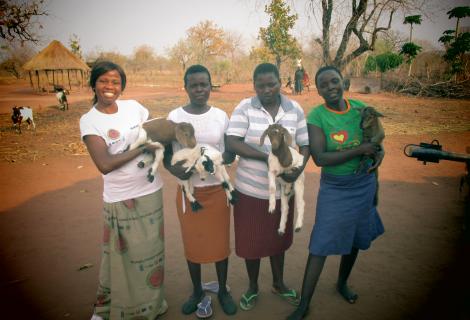Zambezi Valley Resilience Programme

Making ‘REAL’ the gender equality ‘RHETORIC’ for women living in rural areas
Women in rural areas struggle with poverty and marginalization. Addressing gender inequality in rural areas is paramount to achieving gender equality and women’s empowerment by focusing on climate-resilient agriculture or food security and nutrition. This is what the Zimbabwe Resilience Building Fund (ZRBF) Programme being implemented in the Zambezi Valley aims to do. Women in rural areas are constrained by social norms that define them primarily as mothers and house workers. Women are typically expected to be subservient to men because of gender-based discrimination hence most of their work remains unseen, unrecognized and undervalued.
Mavis Mawere (42), Takaitei Kahondo (29) and Edna Chipanya (32) are women goat farmers from Madzerevete Ward in Mbire District in the Zambezi Valley. They have 32 goats procured through support from the ZRBF. In the Zambezi Valley, the ZRBF programme is being implemented by the Zambezi Valley Alliance (ZVA) Consortium where ActionAid Zimbabwe is the lead organization working in partnership with other organizations such as the Zimbabwe Environmental Lawyers Association, (ZELA), Afrosoft Private Limited, and the African Breeders Services Total Cattle Management (ABS-TCM-). Other ZVA supported districts are Binga and Kariba which are in the Zambezi Valley.
The goat project aims to improve the indigenous breed that is found in the district and most importantly to empower women with an economic assert to build resilience in times of stress, shocks and disasters. About 66% of the 1337 farmers in Binga, Kariba and Mbire are running the goat projects supported by the ZRBF.
Supporting women’s control of, and agency over their lives and shifting power
The ZRBF programme in the Zambezi Valley has afforded women the ability to speak up and make choices, which is key to improving their lives. Economic empowerment comes with a voice and choice. Mavis spoke passionately about how the programme has afforded the women an opportunity to improve their knowledge on goat production while gaining income and actively involved in decision making at household level.
Reducing the burden of unpaid care work on women
Mavis said she and other women in the community were now earning a living through goat production. They are now seen as equals by their husbands who are now willing to help in household care work. This has reduced the burden of unpaid care work on the women. Women and girls continue to bear major responsibility for unpaid household and care work hence time and labour burdens associated with lack of infrastructure fall heavily on them. Mavis’ group received a water cart from the ZRBF programme to assist with collecting water. Takaitei said the 200litre water cart had gone a long way to ease their burden of collecting water which they dedicated the whole day to do prior to receiving the cart. The water cart has helped the women spend less time of about three hours on collecting water and more time to concentrate on their goat project.
Turning women into critical change agents for poverty reduction
Poverty increases with the time spent on unpaid care work. This also increases economic pressures families face resulting in gender-based violence (GBV). This is compounded by women’s financial dependence on men within the households which infringe on women's ability to join the labour market and improve their economic chances. Edna Chipanya said she could hardly afford necessities like food and clothes prior to the introduction of the goat project. Now she can buy her own clothes and food reducing GBV in her home and giving her the right to decide on what she wants to do with her money. A mature boar buck can weigh up to 120kgs hence the cross breeding that is done with indigenous goats to improve the growth rates and meat yields. This translates to more income for the women especially when they sell the goats. Economic independence for women leads to better and equitable relationships between couples in Mbire according to Mavis.
Recognising and valuing unpaid care work through gender responsive public services
Sustainable Development Goal 5.4 mandates governments to recognize and value unpaid care work. This is done through the provision of public services, infrastructure and the promotion of shared responsibility which empowers women and girls. There is need to raise awareness of the over exploitation of women living in rural areas and make the economic value of unpaid care work more visible. Adequate advocacy in recognizing and valuing the hidden work that women are doing through gender-disaggregated data and gender-sensitive programming is essential. There is need to Reduce the drudgery of unpaid work for women and Redistribute care work within households. Government should provide care services for children, people with disabilities and the elderly so that women like Mavis have time to do productive and decent work.
THANK YOU ZRBF!!!